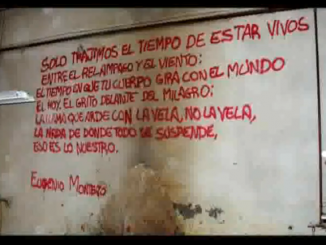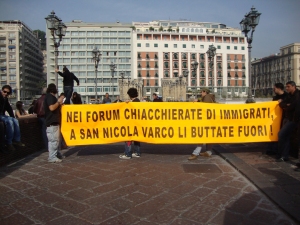
“Re-cordar” Can Ricart: to pass it back through the heart
Twelve years after the approval of "Plan 22@", two pieces of news show us the long-term impact of the displacement of factories from Poblenou neighborhood, and of its supposed urban renewal. The Mas Candle manifacturer closed in march, exactly five years after being removed from their old location in Can Ricart; in april, four people died in a fire of a shack close to the Jean Nouvel's new Parc Central [link here]. The words of Jaume Pagès, former administration manager of the factory, take us back to the sensations of that old battle we lost but we didn't forget.
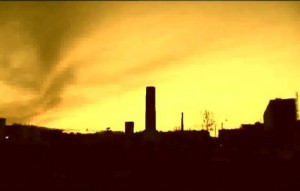 el desahucio
"bueno,
en primer lugar, te sientes echado, no querido, violentado. se rompe de pronto el universo ese repetitivo e invariable y, sin avisar, todo zozobra,
nada parece real.
incluso los cambios en el barrio,
los derribos,
no tienen ninguna connotación positiva, sólo resultaban amenazadores,
tristes.
trasladar una empresa es complicado.
es decir,
debería serlo, pq una empresa, por encima de todo,
la forman personas.
eso quiere decir q se trastorna –de pronto- toda la cosmogonía de tooodos los integrantes...
el desahucio
"bueno,
en primer lugar, te sientes echado, no querido, violentado. se rompe de pronto el universo ese repetitivo e invariable y, sin avisar, todo zozobra,
nada parece real.
incluso los cambios en el barrio,
los derribos,
no tienen ninguna connotación positiva, sólo resultaban amenazadores,
tristes.
trasladar una empresa es complicado.
es decir,
debería serlo, pq una empresa, por encima de todo,
la forman personas.
eso quiere decir q se trastorna –de pronto- toda la cosmogonía de tooodos los integrantes...
 el desahucio
"bueno,
en primer lugar, te sientes echado, no querido, violentado. se rompe de pronto el universo ese repetitivo e invariable y, sin avisar, todo zozobra,
nada parece real.
incluso los cambios en el barrio,
los derribos,
no tienen ninguna connotación positiva, sólo resultaban amenazadores,
tristes.
trasladar una empresa es complicado.
es decir,
debería serlo, pq una empresa, por encima de todo,
la forman personas.
eso quiere decir q se trastorna –de pronto- toda la cosmogonía de tooodos los integrantes...
el desahucio
"bueno,
en primer lugar, te sientes echado, no querido, violentado. se rompe de pronto el universo ese repetitivo e invariable y, sin avisar, todo zozobra,
nada parece real.
incluso los cambios en el barrio,
los derribos,
no tienen ninguna connotación positiva, sólo resultaban amenazadores,
tristes.
trasladar una empresa es complicado.
es decir,
debería serlo, pq una empresa, por encima de todo,
la forman personas.
eso quiere decir q se trastorna –de pronto- toda la cosmogonía de tooodos los integrantes... 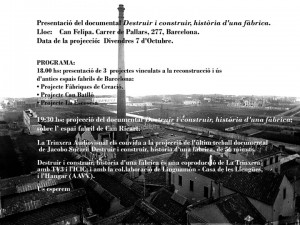
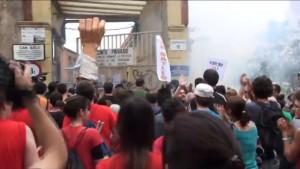

 The transformation of the center of Alcoy, the most ancient industrial city in Spain, between Valencia and Alicante, entails great demolitions in the Partidor neighborhood, cradle of the spanish working class movement. The City Council is buying the buildings of the neighborhood one by one, then
The transformation of the center of Alcoy, the most ancient industrial city in Spain, between Valencia and Alicante, entails great demolitions in the Partidor neighborhood, cradle of the spanish working class movement. The City Council is buying the buildings of the neighborhood one by one, then 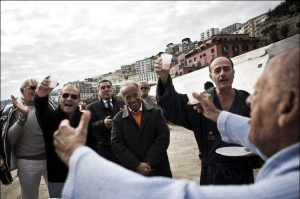

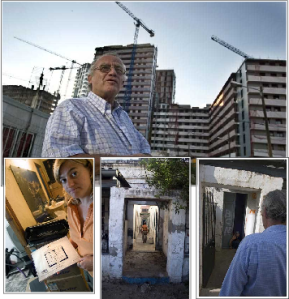 “…on saturdays we went out, and she and her sister remained with our neighbor, miss Maria, and wouldn't come with us. [...] We would have taken them to the cinema, to Mcdonald’s, but they didn't want! They wanted to stay here in the alley“.
“…on saturdays we went out, and she and her sister remained with our neighbor, miss Maria, and wouldn't come with us. [...] We would have taken them to the cinema, to Mcdonald’s, but they didn't want! They wanted to stay here in the alley“.
